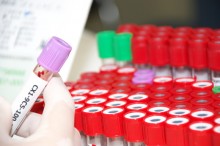Stemina, Eyeing Boston VC, Launches Large Autism Diagnostic Study

With a new $ 2.7 million federal grant in hand, Stemina Biomarker Discovery has launched a 1,500-patient study of its experimental test to diagnose children with autism spectrum disorder. According to the company, it’s the largest clinical trial ever of this type of autism test—one that measures residues in the blood called metabolites.
Stemina, a Madison, WI-based startup that recently established a presence in the Boston area, has now raised $ 8.4 million from investors and $ 6.75 million in grants, including the new $ 2.7 million award from the National Institute of Mental Health.
Stemina is trying to propel its diagnostic technology to market, first targeting autism, and eventually other neurological disorders like schizophrenia and depression, CEO Elizabeth Donley says. The company also has a revenue-generating business that uses the same technology to screen chemicals and other compounds for potential harmful effects on humans.
Founded in 2006, Stemina has already completed three smaller studies of its blood-based test for autism. One was published in PLOS One last year and showed the test’s ability to identify autistic children with 81 percent accuracy. Those three studies examined banked blood samples from more than 500 patients.
The new study—dubbed the Children’s Autism Metabolome Project, or “CAMP”—will enroll children from six sites nationwide who are ages 18 months to 4 years old. The plan is to examine 500 children with autism, 500 with other neurodevelopmental disorders, and 500 who appear to be developing normally. Stemina anticipates enrollment of all 1,500 subjects to take 18 to 24 months, Donley says.
The CAMP study will expose Stemina’s test across a larger set of patients and, if all goes well, could be what regulators require to grant marketing clearance.
“This is a great opportunity to [produce] a high quality set of data to validate our earlier discoveries,” Donley says.
The average age of diagnosis for an autistic child in the U.S. is 4, although certain healthcare facilities with the right expertise can provide reliable diagnoses at age 2, Stemina says. Diagnosing the disorder as early as possible is important because some studies have shown earlier treatment can boost the child’s cognitive and social skills. The challenge is that the current standard for diagnosis is a series of behavioral tests conducted by experts. Stemina and others think that a reliable blood-based test might be more objective, accurate, and able to detect autism sooner.
Plenty of research has been done the past few years to find a reliable blood-based test to diagnose children sooner, with varying degrees of success. Unlike Stemina, most of those have tried to detect the disorder by examining the activity, or expression, of genes.
Lexington, MA-based SynapDx is one closely watched company trying to commercialize such a test. It has raised more than $ 32 million, and in 2013 it launched an 880-patient, 20-site study of its diagnostic that primarily analyzes RNA molecules in the blood, as a way to measure gene expression.
Donley previously told Xconomy her company’s test might have an advantage by studying metabolites instead of gene expression because they provide “a readout of the organism’s current state in real time,” and they show promise pinpointing what’s different about each child’s case.
Ultimately, the goal would be to not only diagnose autism sooner, but also better understand the nature of each child’s condition so that a more effective treatment can be prescribed.
The early research by Stemina and its partners has identified … Next Page »
(78)


